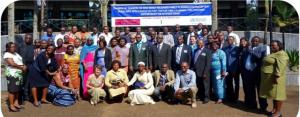WHO trains health workers on new Family Planning guidelines
The World Health Organization Regional Office for Africa is training national trainers and tutors from Burkina Faso, Cote D’Ivoire, Ethiopia and Uganda on the newly released Family Planning contraception guidelines and their derivative tools. The focus of the training is on unintended pregnancy and closely spaced pregnancies (Postpartum family planning) and use of family planning methods immediately after and within 48 hours of an abortion, before fertility returns (Postabortum contraception).
In the training, participants were oriented on the updated WHO Family Planning Evidence-based Guidelines; the Postpartum Family Planning and Postabortum contraception; the use of the Family Planning training resource package for service providers; and they agreed on the next steps for strengthening the quality of pre-service and in-service training and capacity building for Family Planning service providers at all levels.
The training was opened by the Acting WHO Representative in Uganda, Dr. Tarande Constant Manzila who informed participants that meeting the Family Planning needs for modern methods in developing countries would lead to a 70% drop in unintended pregnancies, that is, from 74 million to 22 million per year. Similarly maternal deaths would drop by 67% and newborn deaths would drop by 77%.
“Family Planning is one of the most cost-effective and life-saving interventions of public health importance”, he pointed out.
Dr. Tarande highlighted the persistent challenges that hinder progress of Family Planning in Africa despite efforts by national authorities and partners and urged participants to propose coherent and inclusive solutions to them.
Dr.Placcid Mihayo from the Ministry of Health who represented the Acting Director General of Health Services at the opening reported that, according to the Uganda Demographic and Health Survey 2016, the maternal mortality ratio has reduced from 438 to 336 per 100,000 live births. He added that the contraceptive prevalence rate has now moved to 39% from 30 % since 2011.
According to Dr. Mihayo, scaling up post-partum Family Planning is crucial for Uganda given the country’s high fertility rate of 5.4% and the increasing numbers of teenage pregnancies that rose from 24% in 2011 to 25% in 2016. He therefore hoped that the training will contribute to curbing the increasing teenage pregnancies and their health, social and economic consequences in Uganda.
The WHO Regional Office for Africa, with support from the Bill and Melinda Gates Foundation is implementing a regional platform to strengthen Family Planning programs performance in African countries. The project addresses the high unmet family planning needs in the postpartum, postabortum, and among adolescents in Burkina Faso, Cote D’Ivoire, Ethiopia and Uganda.
The on-going Inter-country workshop for National Trainers is the first step towards capacity building of national trainers from Ministries of Health, WHO, Obstetric and gynecologist societies and midwifery training institutions to support the scale up of Postpartum family planning and Postabortum contraception training. The training is conducted by WHO and co- facilitated by JHPIEGO.



